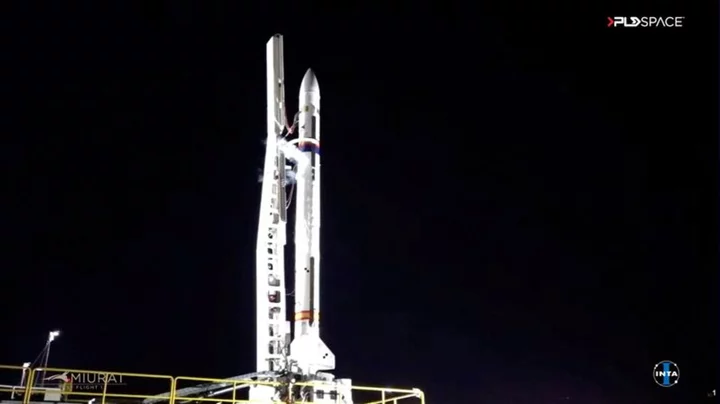MADRID Spanish startup PLD Space will attempt a test launch of its reusable Miura-1 rocket early on Saturday, spearheading a new generation of 'microlaunchers' after an aborted attempt in June.
The rocket is due to lift off on its suborbital test mission at 2 a.m Spanish time on Saturday (0000 GMT) from Huelva in southwest Spain, marking what its designers say will be Europe's first fully private rocket launch.
A first attempt to launch in May was abandoned due to strong high-altitude winds and an attempt in June failed when umbilical cables in the avionics bay did not all release in time, halting the lift off as smoke and flames spewed out from the rocket.
Airspace, areas of the sea and roads have been closed round the high-security site. Public viewing points have been set up.
"The day has arrived," Raul Torres, PLD Space chief executive and co-founder of PLD Space, wrote on social media platform X, previously known as Twitter.
He said earlier this month that exhaustive tests had been carried out on the Miura including areas that failed in June.
Europe's efforts to develop capabilities to send small satellites into space are in focus after a failed orbital rocket launch by Virgin Orbit from Britain in January. That system involved releasing the launcher from a converted Boeing 747.
PLD Space's Miura-1 rocket, named after a breed of fighting bulls, is as tall as a three-storey building and has a 100-kg (220-pound) cargo capacity. It can also be used to carry out zero-gravity experiments.
Saturday's mission on Miura-1 demonstrator is the first of two suborbital missions to be carried out before orbital rides are scheduled to begin on the larger Miura-5 in 2025.
The launch will carry a payload for test purposes but this will not be released, the company said.
If successful, it will be the first time a rocket has lifted off from continental Europe outside Russia, experts say.
Competitors lining up to join the race to launch small payloads include companies in Scotland, Sweden and Germany.
In July, the last launch of Europe's largest rocket, the premier Ariane 5 space launcher, took place at the European spaceport in Kourou, French Guiana.
Europe has until recently depended on Ariane 5 and its 11-tonne-plus capacity for heavy missions, as well as Russia's Soyuz launcher for medium payloads and Italy's Vega, which is also launched from Kourou, for small ones.
The end of Ariane 5 has left Europe with virtually no autonomous access to space for several months until its successor Ariane 6, is launched.
That milestone has been delayed until 2024 and the European Space Agency said last week that Vega-C, the newest version of the Vega rocket, would not return to service until the fourth quarter of 2024, following a failed mission last December.
(Reporting by Emma Pinedo and Tim Hepher, writing by Tim Hepther and Aislinn Laing; Editing by Edmund Blair)

